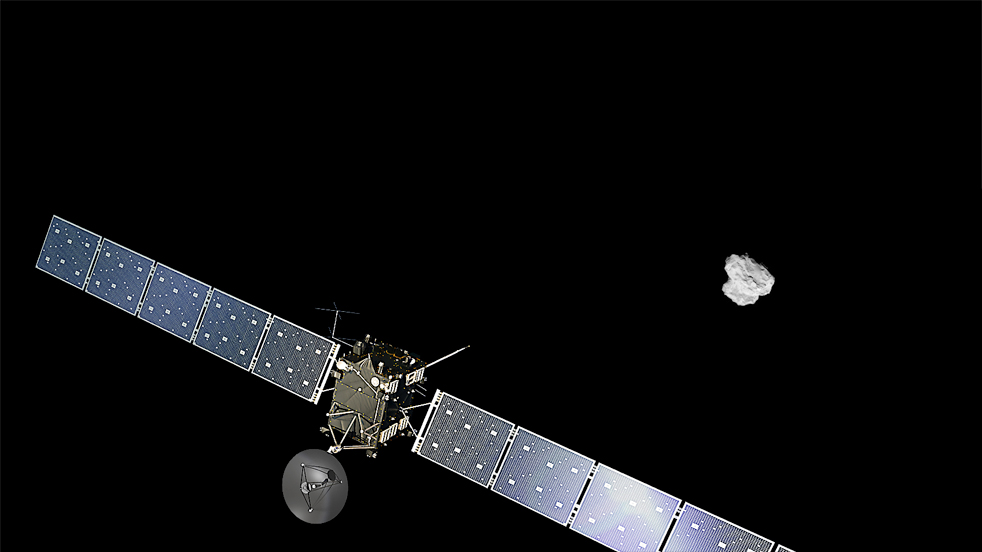Rosetta Probe Makes Historic Comet Rendezvous Wednesday Morning: Watch Live

After an epic, decade-long trek across the solar system, the European Space Agency's Rosetta spacecraft will finally catch up to its target comet early Wednesday (Aug. 6). If all goes according to plan, Rosetta will become the first probe ever to orbit a comet, and you can watch the historic rendezvous live online.
Rosetta is expected to meet up with Comet 67P/Churyumov-Gerasimenko at 4:45 a.m. EDT (0845 GMT) Wednesday, with a crucial 6.5-minute-long engine burn propelling the spacecraft into the comet's orbit. You can watch a live webcast of all the action here at Space.com beginning at 4 a.m. EDT (0800 GMT), courtesy of the European Space Agency (ESA).
Once Rosetta is in the gravitational grip of the comet, the spacecraft will execute a series of triangular loops around the comet. Each loop will be about 62 miles (100 kilometers) long and take a few days to complete, mission officials said. [Photos: Europe’s Rosetta Comet Mission in Pictures]

Rosetta blasted off from French Guiana in March 2004. During its 4-billion-mile (6.4-billion-kilometer) chase, the spacecraft zoomed around Earth three times and Mars once for "gravity assists" that helped the spacecraft pick up speed. Rosetta also got up close and personal with two asteroids during its travels.
When Rosetta reached Jupiter's orbit in 2011, ESA engineers put the spacecraft into a deep-space slumber that lasted more than 2.5 years. Rosetta woke up in January this year for the final phase of its journey to Comet 67P, which is about 2.5 miles (4 km) wide and takes roughly 6.5 years to complete one lap around the sun.
Rosetta has since performed a series of complex maneuvers to slow down and match the comet's pace. Now, the probe is poised to enter the comet's orbit and travel with it around the sun. Rosetta is also carrying a lander called Philae that's expected to touch down on the comet in November to take samples and study the comet's surface and composition.
Comets are some of the oldest celestial bodies in the solar system, and ground observations have revealed that these icy wanderers are rich in organic material. Comets that pummeled Earth during the planet's infancy could have brought the essential ingredients for life, researchers say. ESA scientists hope studying comets more closely will reveal information about the origins of life on Earth and the origins of the solar system.
Get the Space.com Newsletter
Breaking space news, the latest updates on rocket launches, skywatching events and more!
The Rosetta mission is slated to end in December 2015.
Follow Kelly Dickerson on Twitter. Follow us @Spacedotcom, Facebook or Google+. Originally published on Space.com.
Join our Space Forums to keep talking space on the latest missions, night sky and more! And if you have a news tip, correction or comment, let us know at: community@space.com.

Kelly Dickerson is a staff writer for Live Science and Space.com. She regularly writes about physics, astronomy and environmental issues, as well as general science topics. Kelly is working on a Master of Arts degree at the City University of New York Graduate School of Journalism, and has a Bachelor of Science degree and Bachelor of Arts degree from Berry College. Kelly was a competitive swimmer for 13 years, and dabbles in skimboarding and long-distance running.
Most Popular

